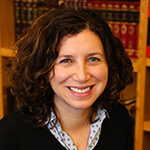Sukkot: Imagining the Framework for a Better World
Sept. 30, 2020
By Wendy Amsellem and Mike Moskowitz
This is the week in the Jewish calendar when we shift focus from repentance and introspection into the world of action. We move from the preparations and reflections of Elul, and the fasting and praying on Yom Kippur, to the immediate building of our sukkot. We try hard to live up to the ideals of our newly penitent selves and to persevere in the goals we have recently set. One of the best ways to prevent falling into old patterns and habits is to step away from our familiar structures and systems, and to reposition ourselves anew in the sukkah.
An important step in creating a better society (and sukkah!) is having a clear sense of what we are trying to construct. Sometimes it is hard to imagine the possibilities. When I (Wendy) was a student, Justice Ruth Bader Ginsburg told us that during her first year of law school, in 1956, she and the handful of other women in her class were asked by the law school dean to justify taking the place of a man at Harvard Law School. Justice Ginsberg explained that at that point in her life she had not yet fully discovered her feminism and she was fearful of sounding too aggressive. She told the dean that she had come to law school to better understand her husband's career and that maybe one day it would lead to a part-time job. When we heard this story, we were deeply moved that Justice Ginsburg herself could not foresee how her career would develop.
In a 2016 essay in the New York Times, Justice Ginsburg reported that school children visiting the Supreme Court often asked her, "Did you always want to be a judge, or more exorbitantly, a Supreme Court justice?" Ginsburg noted, "To today's youth, judgeship as an aspiration for a girl is not at all outlandish." Things which are hard to imagine today can swiftly become commonplace. Justice Ginsburg taught us that it is important to challenge the assumption that the way things have been is itself a justifiable reason for them to continue that way, even if we are not sure what the replacements will be.
As the people of Israel traveled through the wilderness, they also did not know from day to day where they were going. The Babylonian Talmud (Sukkah 11b) explains that we dwell in sukkot to commemorate the "Clouds of Glory/Clouds of Dignity" (annanei hakavod) that protected the Israelites in the wilderness and directed them on their journey. Bavli Taanit (9a) teaches that there were three miracles that God performed for the people of Israel in the desert. God provided the people with water, manna, and clouds of glory. Our rabbis ask why it is only the cloud that merited having a festival or scriptural commandment to remember it?
Rabbi Chaim Yosef David Azulai (1724-1806) explains that the clouds of glory are evidence of God’s special love for us. Food and water are basic necessities, but the clouds of glory provide comfort and honor to people living in a wilderness. Maimonides explains (Laws of Shabbat 2:3) that the laws of the Torah provide mercy, kindness, and peace "רַחֲמִים וְחֶסֶד וְשָׁלוֹם" and so God's kindness to us in providing clouds of glory is memorialized each year in the commandment to build a sukkah. It is not coincidental that the numerical value of peace (שלום) is the same as the phrase mercy and kindness (רַחֲמִים וְחֶסֶד) because one is dependent on the other. In our evening prayers, we ask that God spread out over us "God’s Sukkah of Peace." By creating structures that advance dignity and not just survival, we help to build God's Sukkah of Peace.
The three gifts that God gave the Israelites in the desert are associated with their three leaders (Taanit 9a). The water was provided in the merit of Miriam; the manna in merit of Moshe; and the clouds of glory are in the merit of Aaron. Aaron was a person who valued dignity, peace and love. According to the rabbis, Aaron was a perennial peacemaker, rushing to settle quarrels and promote affection between spouses, friends, and enemies. We are taught (Avos 1:12) to be disciples of Aaron; love peace, pursue peace, love creations, and bring people closer to the Torah.
The Sukkah then is not only a commemoration of God's love for us, but also of Aaron's values of collegiality and peace. As we remember one of our more contemporary leaders, Justice Ruth Bader Ginsburg z”l, we recall that she too valued collegiality and friendship. Justice Ginsburg had clear and strong ideals but she was famous for cultivating warm friendships with colleagues who held dramatically different opinions about law and society.
Aaron, as the Kohen Gadol, also was also instructed to wear garments of honor and dignity, as part of his job description, Exodus 28:2. Aaron used his dignified position not to seek more power for himself, but to pursue peace in the world of action. He was successful in orchestrating resolutions because people felt how deeply he cared about them. Aaron understood that peace, not money or power, was the greatest blessing. The commentators point out that the phrase "good grace" has the same numerical value as "Kohen," 75, because that is the essence of the priestly role; to extend the divine presence to the people, not to hoard or exploit it.
King Solomon wrote in Proverbs (22:1), "A good name is preferred to wealth, and good grace (chein) is better than silver and gold (נִבְחָ֣ר שֵׁ֭ם מֵעֹ֣שֶׁר רָ֑ב מִכֶּ֥סֶף וּ֝מִזָּהָ֗ב חֵ֣ן טֽוֹב׃)." Proverbs reminds us that what we may see as our "permanent" acquisitions are really external to who we are and often quite temporary. There is a false grace that is superficial and fleeting, but the good grace is empowering and instills a sense of responsibility for the greater good to prevent injustice. The first letter of the first four words of the verse which spell “נשמר – to guard — allude to this.
The Talmud (Bavli Sukkah 2a) tells us that we must leave our permanent houses and move into temporary homes. But later, (Bavli Sukkah 28b) advises us that for the seven days of Sukkot we should make our sukkot into our permanent houses. One way to understand this apparent contradiction is that we must look at socially constructed privileges as temporary and external, and utilize the time in the sukkah to remember that we were dehumanized in Egypt and God reminded us of our worth. The festival of Sukkot is a time to plan for a better model that prioritizes human dignity as essential. Then, we can then make the temporary permanent by disrupting the systems that perpetuate injustice and protections for the entitled at the expense of those who are truly afflicted.
The struggle to take our resources and use them for the greater good is observed by the Talmud in Shabbat 104a through the order of the Hebrew alphabet. "If we do acts of loving kindness to those in need (gimmel and daled) then God (heh and vav) will sustain (zein) and provide good grace (chet tet)." The rabbis point out that if we misuse those resources selfishly then it is the root of evil and sin (cheit ‘חט).
Building a more just and equitable society is complicated, difficult work. It requires us to re-examine fundamental assumptions about how our communities work and to be willing to dismantle structures of injustice. The way forward is not always clear, but as we build our sukkot we can begin to imagine setting up the framework of a better world. In his eulogy, Chief Justice John Roberts remembered, "Ruth used to ask, 'What is the difference between a bookkeeper in Brooklyn and a Supreme Court Justice?' She would answer: 'One generation.' " Our actions, to continue the struggle for equality and dignity for all, will make what comes next possible.
May the memory of Ruth Bader Ginsburg be a blessing in that it motivates us to be agents of graceful change.
 Rabbi Wendy Amsellem teaches Talmud and Halakha at Yeshivat Maharat and is the Director of the Beit Midrash Program. (Pronouns: She/Hers)
Rabbi Wendy Amsellem teaches Talmud and Halakha at Yeshivat Maharat and is the Director of the Beit Midrash Program. (Pronouns: She/Hers)
 Rabbi Mike Moskowitz is a Scholar-in-Residence in Trans and Queer Jewish Studies at Congregation Beit Simchat Torah in New York. (Pronouns: He/Him)
Rabbi Mike Moskowitz is a Scholar-in-Residence in Trans and Queer Jewish Studies at Congregation Beit Simchat Torah in New York. (Pronouns: He/Him)